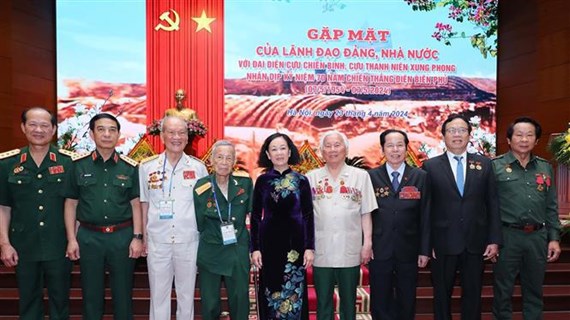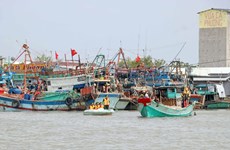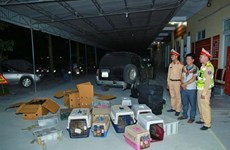Vietnam targets rational, effective use of energy resources
Vietnam aims at using local energy
resources in a rational and effective manner, meeting energy demands
with improved quality and ensuring the national energy security.
Vietnam aims at using local energy
resources in a rational and effective manner, meeting energy demands
with improved quality and ensuring the national energy security.
The statement was made by Deputy Prime Minister Hoang Trung Hai at the eighth session of the Vietnam-France Economic and Financial Forum being held on Nov. 17-18 in the northern province of Quang Ninh.
According to the Deputy PM, the country will formulate and develop, step-by-step, a competitive energy market, and promote new and renewable energy resources to keep pace with the rapid and sustainable development of the energy industry.
The Deputy PM expressed his hope that with France ’s experience in energy, French experts will coordinate with the Vietnamese colleagues in researching sustainable energy development.
At the forum, French Ambassador to Vietnam Herve Bolot said it was the right time for the two countries to step up cooperation and discussion on long-term strategies in order to define targets for the sustainable development and effective use of energy, and come up with solutions appropriate with Vietnam’s 2010-2015 strategy.
The forum focuses on the impact of energy policy on CO2 emissions, power production, energy efficiency and economic growth, as well as on policies on finance management and mobilisation for the energy industry.
Vietnamese and French experts presented reports on the mid- and long-term challenges facing energy policy and plans to rapidly develop an economy in parallel with the environmental protection and reduction of harmful emissions.
Reports at the forum said Vietnam ’s economy over recent decades has developed strongly and swiftly, fuelling a sharp, steady increase in demand for energy.
Over the past 20 years, the country’s consumption of primary energy increased 2.56 times, end-use energy, 2.43 times, and energy commodities, 10.7 times (66 billion kWh in 2008).
However, electricity consumption in Vietnam is still much lower than in other countries, particularly developed countries in ASEAN and Asia.
The country’s energy industry has been growing in all segments ranging from exploration, exploitation, and production to distribution and export. The scales of the coal-, oil- and gas-fuelled power industries have expanded to meet the demands of national socio-economic development.
However, the country’s energy consumption still relies on traditional resources such as coal, oil, natural gas and hydro-electricity. Its use of renewable energy has been increasing but the proportion of renewable energy consumption relative to total energy consumption fell from 74.1 percent in 1990 to 36.4 percent in 2007. The dependence trend is forecast to continue in the coming decades.
In addition, the country is facing waste and inefficiency in using energy due to out-dated technology and equipment. The country’s energy consumption for every 1,000 USD is high, at 1,250kWh./.
The statement was made by Deputy Prime Minister Hoang Trung Hai at the eighth session of the Vietnam-France Economic and Financial Forum being held on Nov. 17-18 in the northern province of Quang Ninh.
According to the Deputy PM, the country will formulate and develop, step-by-step, a competitive energy market, and promote new and renewable energy resources to keep pace with the rapid and sustainable development of the energy industry.
The Deputy PM expressed his hope that with France ’s experience in energy, French experts will coordinate with the Vietnamese colleagues in researching sustainable energy development.
At the forum, French Ambassador to Vietnam Herve Bolot said it was the right time for the two countries to step up cooperation and discussion on long-term strategies in order to define targets for the sustainable development and effective use of energy, and come up with solutions appropriate with Vietnam’s 2010-2015 strategy.
The forum focuses on the impact of energy policy on CO2 emissions, power production, energy efficiency and economic growth, as well as on policies on finance management and mobilisation for the energy industry.
Vietnamese and French experts presented reports on the mid- and long-term challenges facing energy policy and plans to rapidly develop an economy in parallel with the environmental protection and reduction of harmful emissions.
Reports at the forum said Vietnam ’s economy over recent decades has developed strongly and swiftly, fuelling a sharp, steady increase in demand for energy.
Over the past 20 years, the country’s consumption of primary energy increased 2.56 times, end-use energy, 2.43 times, and energy commodities, 10.7 times (66 billion kWh in 2008).
However, electricity consumption in Vietnam is still much lower than in other countries, particularly developed countries in ASEAN and Asia.
The country’s energy industry has been growing in all segments ranging from exploration, exploitation, and production to distribution and export. The scales of the coal-, oil- and gas-fuelled power industries have expanded to meet the demands of national socio-economic development.
However, the country’s energy consumption still relies on traditional resources such as coal, oil, natural gas and hydro-electricity. Its use of renewable energy has been increasing but the proportion of renewable energy consumption relative to total energy consumption fell from 74.1 percent in 1990 to 36.4 percent in 2007. The dependence trend is forecast to continue in the coming decades.
In addition, the country is facing waste and inefficiency in using energy due to out-dated technology and equipment. The country’s energy consumption for every 1,000 USD is high, at 1,250kWh./.













